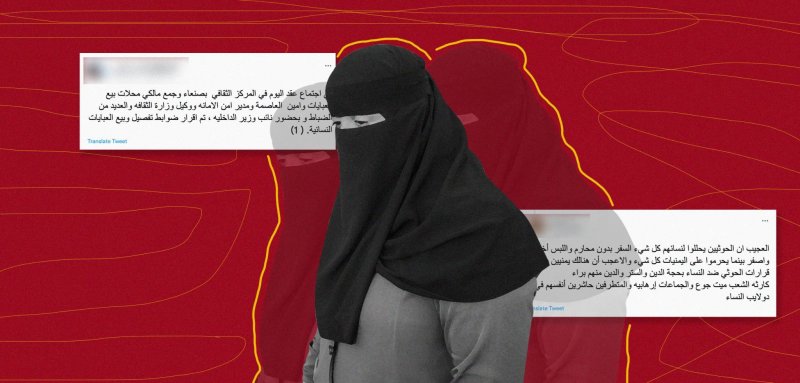Despite the continued economic collapse, security failure, and other pressing issues in the country, a number of leaders of the Houthi group in Yemen, have recently decided to focus their attention on women's clothing in the areas under its control. This focus reached the point of holding a high-level meeting among the most prominent security and civilian leaders in the capital, Sana'a, to “engineer” women's abayas and decide on the shape and specifications of what is permitted for them to wear.
Earlier this month on January 10, 2023, Reuters correspondent in Yemen Mohammed Ghobari reported in a series of tweets on his Twitter account, saying, "In a recent development, a meeting was held in Sana'a a few days ago, bringing together key Houthi figures, including the governor and other security officials, along with the owners of shops selling women's abayas, and which aims to exert control over the sale and trade of women's abayas.” The meeting that was held at the Cultural Center in Sana'a and brought together the owners of abaya shops, the mayor of the capital, the director of the secretariat's security, the undersecretary of the Ministry of Culture, along with many other officers, and in the presence of the Deputy Minister of Interior, saw the dress regulations for designing and selling women's abayas being agreed upon.
Ghobari stated that Houthi officials informed the owners of shops that tailor and sell women's abayas of their approved regulations regarding the shape of the abaya and told them that everyone must abide by these controls, adding, “The decision stipulates that the abayas should only be loose and plain and should not reveal any part of a woman's body.” He concluded that the officials said the abayas can be accompanied by a head scarf and only burqas with an opening, and that it is forbidden to tailor or sell colorful, tight, or short abayas.
In areas controlled by the #Houthis in #Yemen, a meeting was held among the highest security and cultural leaders to "approve the regulations for tailoring and selling women's abayas"!
Yemeni political activist Noura al-Jarwi commented on this step by describing the Houthi group as an "extremist group", expressing her wonder at how “the Houthis allow everything for their women: traveling without a mahram and wearing green and yellow while depriving Yemeni women of everything, and the even more surprising thing is that there are Yemenis who support the Houthis’ decisions against women under the pretext of religion and concealment, even though religion is innocent of their actions.” She goes on to add, “It's a disaster. The people are dying of hunger and terrorist groups and extremists are sticking themselves into women's affairs."
This is the latest in a series of Houthi measures to exclude women from the public sphere and restrict their freedom in it. It was preceded by restrictions on travel, public transportation, education, work, and more.
Women’s events without the presence of women
A few days ago, Yemeni activists circulated on social media, with a mixture of ridicule and anger, pictures of women-related events held in areas under Houthi control without the appearance or presence of any women.

One of these events is the "Religious Women's Day" celebration held by Ibb University. Some commentators even asked, "Where is the woman in this? Whether a believer or not, where is she in the picture?"
Before that, pictures of a meeting of the “Yemen Women Union - Raymah branch”, were circulated, also without the presence of women.
Restrictions on movement too
At the end of last year, verbal instructions banning women from traveling without a "mahram” – a male guardian who’s usually a first-degree relative and whom a woman may not marry, such as a father, brother, and uncle – in Houthi-controlled areas caused uproar and outrage, as the decision obstructed the work of many Yemeni women.
At the time, Hussein al-Ezzi, Deputy Foreign Minister in the Sana'a government, defended this decision on his Twitter account, saying that the mahram goes beyond being a religious tradition, to being a security need as well, "as targeting has not even reached men with grown mustaches”.
In #Yemen, “The people are dying of hunger and terrorist groups and extremists are sticking themselves into women's affairs"
A systematic policy of "demeaning women"
According to Yemeni journalist and university professor Dawlah al-Hasbani, there is a systematic policy by the Houthi group to "demean women and deal with them as incompetent beings."
She enumerates the "methods of intransigence and derogation" applied by the fundamentalist group so that the space for women is "narrowing further" in the areas under its control. "It started with the guardian having guardianship over a woman's right to obtain a passport, then over her travel, leading to additional restrictions on her clothes and dealings through what the group issued under the so-called 'code of conduct', which the group claims is based on ‘sharia’," she says.
The code includes provisions that oblige women to "dress in the official Sharia dress code" and to deal according to "Sharia regulations," as the group described. "In addition to previous abuses that affected them in all public facilities, especially in universities and cafes, where they are harassed under the pretext of not being allowed to mix with men," al-Hasbani tells Raseef22.
She goes on to say that the Houthi group "has adopted a line that goes against all civil systems and laws that treat women on an equal basis with men, and even went further by making changes in school curricula that shape the tasks and role of women in the minds of children and young people".
The Houthi group continues to "demean women and deal with them as incompetent beings" by restricting them in the public sphere and "changing curricula that shape the tasks and role of women in the minds of children and young people"
In a previous statement to Raseef22, Yasser al-Selwi, assistant professor of political sociology at Taiz University, said, "In Houthi-controlled areas, the tribe is still the predominant social organization to a large extent, and the culture of patriarchy is part of the tribal culture, and therefore these areas view women as inferior compared to other areas of Yemen."
Al-Selwi said that the Houthi group is working to portray its restriction of women's freedom to travel between Yemeni governorates as if it were in line with the culture and customs of Yemeni society, and "as if the decision will preserve the identity of the Yemeni people!"
The head of Mwatana Organization for Human Rights, Radhya al-Mutawakel, said in a previous statement to Raseef22 that the decision to ban women from traveling without a mahram "is only a small part of the details of many practices that show a dangerous trend to undermine the presence of women in public life, and to end all the gains they have fought for and struggled towards for years," stressing that women do not need what she called "guardians of virtue", nor more restrictions, but rather "they need respect for their personal rights and freedoms, and accountability for all those who violate those rights."
Al-Mutawakel warned that women are among the most marginalized in Yemen, and that they are afraid to talk about the harassment and violations they are subjected to, "as a result of the social stigma that is often blamed on them."
Yemeni identity
Meanwhile, a group of Yemeni women active on social media decided to respond to the Houthi decision in their own way by launching the "Yemeni Identity" campaign, through which they posted their photos and pictures of mothers and grandmothers in traditional Yemeni costumes decorated and embroidered in a variety of colors.
اليمن: ناشطات على مواقع التواصل الاجتماعي يطلقن حملة الكترونية تحت وسم #الهوية_اليمنية، في استعراض للزي التقليدي المتوارث للنساء في اليمن، المتعدد والمتنوع والمزركش بالالوان الزاهية المبهجة، رفضا لاجراءات جماعة الحوثيين الاخيرة الهادفة الى فرض قيود متشددة على لباس المرأة
— يمن فيوتشر (@Yemen_YF) January 15, 2023
2/1 pic.twitter.com/RhShn3hwv9
#الهويه_اليمنيه
— ميلاد ☕︎˹♩ (@six6__o) January 17, 2023
هوية المرأة اليمنية pic.twitter.com/3Or3tQRUh8
Through the hashtag, Radhya al-Mutawakel posted her picture in traditional clothes and commented on it: "We belong to all colors and no one will trap us in one color."
Some Yemeni youth joined the online campaign, posting photos of themselves and their children also wearing traditional dress, with phrases stressing that "our identity is diverse, ancient, and very rich."
Raseef22 is a not for profit entity. Our focus is on quality journalism. Every contribution to the NasRaseef membership goes directly towards journalism production. We stand independent, not accepting corporate sponsorships, sponsored content or political funding.
Support our mission to keep Raseef22 available to all readers by clicking here!
Interested in writing with us? Check our pitch process here!





